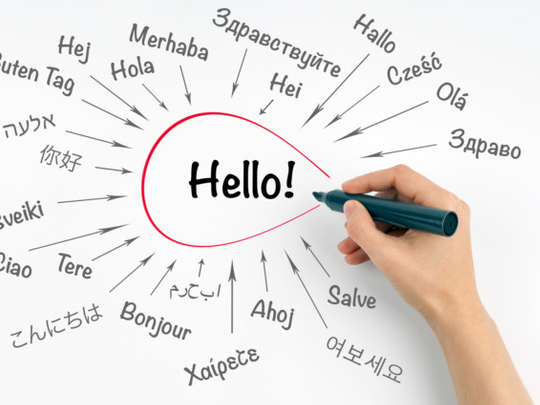
Dubai
“It is almost impossible to view one’s identity without recognising the influence of language on the development, reinforcement and transmission of culture and traditions.” Dr Jaclyn Fowler, an assistant professor with specialisation in second language linguistics at the Canadian University of Dubai, strongly believes in the importance of the mother tongue.
“In first-generation children born to immigrants who learn the language of their birthplace, [it is often] to the detriment of their mother tongue. They are caught between the two cultures.”
Culture and language are inextricably linked.
Research conducted by the United Nations Educational, Scientific and Cultural Organisation (Unesco) shows that a child’s mother tongue or native language is their “primary vehicle of cognitive development in the early years”. But, does this put them at a disadvantage when the language is changed as they enter school?
Dr Fowler does not seem to think so. In her opinion, learning a new language should be additive and not a reason to forget one’s mother tongue. In fact, the mother tongue could be used as a tool to integrate a new language and culture into one’s identity.
First languages are special, states a paper published by the UK-based British Council. It can help families share their values, traditions and cultural identity, along with pick up linguistic cues. If children are taught their mother tongue, they can join in with family and community events, and keep in touch with relatives with ease.
And, being bilingual helps them move between the cultures of their home country and the country of birth.
Dr Fowler said: “Making sure that the mother tongue is preserved helps assure that children fit in, in either community. And the benefit of retaining the mother tongue is that it connects generations to their collective pasts, which is essential to the development of a strong, integrated identity.”
So, this means that knowing your native language and your roots helps you map out your future as well. But, with people migrating to different countries around the world, evolution is inevitable.
Dr Fowler said: “In today’s world, we recognise the importance of being globally-minded, to look outward and understand other cultures and languages. We can, therefore, place more value and emphasis on promoting a bilingual and bicultural view of society, recognising that such a globally-outward perspective may have great benefits to a country and to the individuals within the country.”
Despite that, with the world experiencing rapid globalisation, some languages seem to be forgotten along the way. According to the Linguistic Society of America, 80 per cent of the world’s languages may vanish within the next century.
Dr Diogo Almeida, an assistant professor of psychology with a specialisation in linguistics at the New York University Abu Dhabi, believes that killing a language is the first step in stamping out a culture. Many communities feel that their culture cannot survive after language loss. So, preserving the language “serves the purpose of helping the community maintain their sense of being a community”.
He said: “Many communities over the course of history have lost their original language. It is important to notice that communities can and often do survive the loss of their native language. The fact that there are several language revitalisation programmes being tried throughout the world is a testament to the symbolic power that languages have and how tightly coupled they are with the cultures in which they originated.”
However, there are two sides to every coin. Many people across the world prefer that their children grow up speaking a different language from their mother tongue. Such a decision is taken for practical reasons.
Dr Almeida, explains that this loss of a strong tie to a particular local community is replaced with the potential of “increasing the chances of the next generation to assimilate to and thrive in their new host county’s culture, contributing to their future social mobility”.
This is in no way similar to learning a second or third language later on in life. The end goal is to ensure that the child can thrive in the world at large.
Dr Almeida said: “This does not necessarily mean we must forego the language of our parents, but in some cases it leads to it, as maintaining healthy multilingual communities is not always easy.
The extinction of languages also negatively impacts literature and art, which are an expression of culture.
Dr Fowler said: “Haiku and Beijing Opera, for example, may be accessible to someone without knowledge of the Chinese language and Chinese culture, but only as an artistic event. One’s full understanding of these art forms is impossible. To understand the subtleties, one must understand something of the language and the culture from which they emanate.”
This, however, doesn’t mean that new forms of art and literature will not evolve as mother tongues are forgotten. But, the older forms will grow remote as language and culture are disassociated from them.
So, what can be done to retain the mother tongue? The first step is for both the immigrant and the welcoming country to place value on retaining it.
Dr Fowler said: “Speaking more than one language, understanding more than one culture, and celebrating more than one set of traditions not only creates strong, integrated identities, but also globally-literate citizens.”








